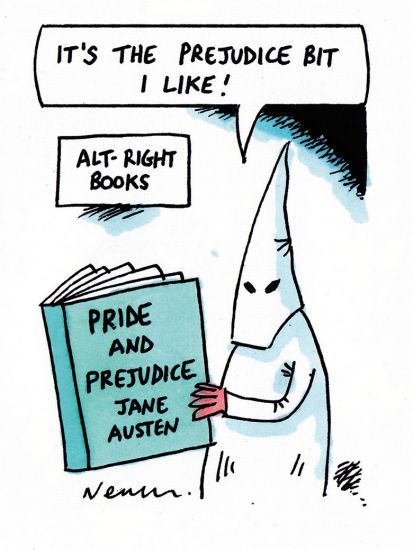
Forget Steve Bannon and Milo Yiannopoulos – America’s “alt-right” movement has new icon: Jane Austen, The Daily Telegraph reported on 21 March. That is the claim of a US scholar who says that the Pride and Prejudice writer has become an unlikely rallying point for the far-right movement that is credited with propelling Donald Trump to the US presidency last year. According to Nicole Wright, assistant professor of English at the University of Colorado Boulder, alt-right websites and blogs frequently reference the British novelist, claiming that her writing supports their views on racial superiority and subservient wives. However, Austen experts were quick to distance her from the alt-right, which is better known for its collection of unpleasant white supremacists and crazed conspiracy theorists who see “deep state” operatives controlling Washington. “No one who reads Jane Austen’s words with any attention and reflection can possibly be alt-right,” Elaine Bander, a former officer of the Jane Austen Society of North America, told The New York Times. “All the Janeites I know are rational, compassionate, liberal-minded people,” she added.
Rugby and football matches between the universities of Sussex and Brighton reportedly descended into “all-out war” during a sports day. Several students were taken to hospital after being hit by projectiles, and police “struggled to control supporters on either side” – one student was even said to have threatened another with a knife, The Daily Telegraph reported on 20 March. According to onlookers, some Sussex students chanted “We get AABs, you get STDs”, while others shouted “Your dad works for my dad”, the newspaper said. “In response, a number of Brighton students are believed to have responded by burning homemade ‘Sussex’ banners,” it added. As an even sharper hierarchy of universities emerges under policies to create increased competition in England, by 2030 expect cities across the nation to be smoking ruins as students at older institutions battle their post-92 counterparts with heavy artillery fire over their respective A-level grades.
Efforts by King’s College, Cambridge to rid itself of geese flocking to its lawns continue to absorb sections of the press. The Cambridge News reported on 18 March that college porters have been given lasers to deal with the problem – to scare the birds away, not to blast them to oblivion. Despite the college’s declaration that it has no plans for a cull “at this time”, some students continue to call for it to expressly rule out lethal methods. The News pictured students protesting with placards bearing slogans including “Give geese a chance” and “This is a literal wild goose chase”.
Stories about child geniuses making it to university several years before their peers have always grabbed the attention of newspaper editors. Surely not a month goes by without an article about a student barely out of nappies embarking on a PhD. What is perhaps rarer is to hear of a teenage prodigy becoming a university teacher. However, just such an extraordinary occurrence has happened at the University of Leicester, where 14-year-old Yasha Asley has been employed to run tutorials for mature students struggling with maths, the Daily Mail reported on 20 March. Yasha, who got an A in A-level maths aged just 8 and is in the final year of a Leicester degree, was interviewed and offered the job when he was only 13, the newspaper said. Times Higher Education is not aware of any child prodigy employee metric in the teaching excellence framework, but if there is, chances are good that Leicester would top it.
Universities in the UK have been warned that the new Higher Education and Research Bill might lead to them being compelled to ensure that freedom of speech is protected on campus. It follows the string of stories about safe spaces and no-platforming, particularly in students’ unions. Jo Johnson, the universities minister, wrote to the sector to remind it that the new laws would allow the government to force institutions to consider matters of public interest, The Times reported on 21 March. Subject to a consultation on the issue, universities could be required “to include a principle about freedom of speech principles in their governance documents”, according to the letter seen by the newspaper. Universities are already duty-bound under an existing law to provide a space for free debate, but if this principle is so vitally important, then it is certainly worth repeating.